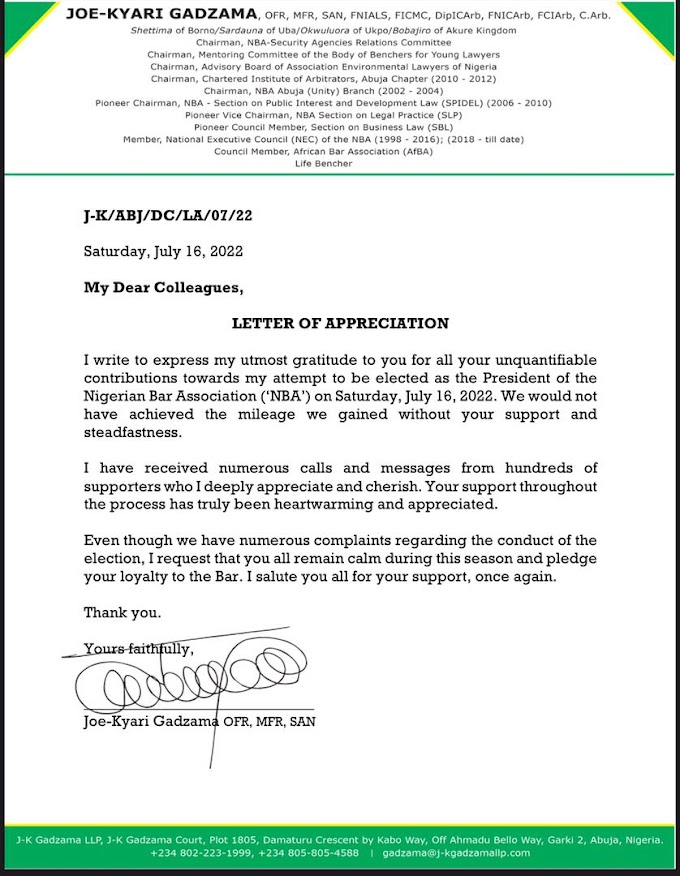Mr. Godwin Emefiele (CON) (Chairman, Board of Directors),
The Governor, Central Bank of Nigeria,
Plot 33, Abubakar Tafawa Balewa Way,
Central Business District,
Cadastral Zone,
Abuja, Federal Capital Territory,
Nigeria.
P.M.B. 0187,
Garki Abuja.
Nigeria.
Mrs. Aishah N. Ahmad (Board Member)
Deputy Governor, Financial Systems Stability Directorate
Mr. Edward L. Adamu (Board Member)
Deputy Governor, Corporate Services Directorate
Mr. Folashodun Adebisi Shonubi (Board Member)
Deputy Governor, Operations Directorate
Dr. Kingsley Obiora (Board Member)
Deputy Governor, Economic Policy Directorate
Non-executive Board Members
Prof. Justitia O. Nnabuko (Board Member)
Director
Adeola S. Adetunji (Board Member)
Director
Prof. Mike I. Obadan (Board Member)
Director
Prof. Ummu A. Jalingo (Board Member)
Director
Accountant General of The Federation
Dr. Abdu Abubakar (Board Member)
Director
Mr. Aliyu Ahmed (Board Member)
Director
Dear Sir,
CBN REGULATIONS ON REVERSAL OF WRONGFUL AND OR ERRONEOUS TRANSFERS: NEED FOR CBN TO GO TOUGH ON BANKS FOR NON COMPLIANCE WITH CIRCULAR BPS/DIR/GEN/CIR/05/011, DATED SEPTEMBER 13TH, 2018 (REGULATIONS ON INSTANT (INTER-BANK) ELECTRONIC FUNDS TRANSFER SERVICES IN NIGERIA)
1. I am a Legal Practitioner, who at present practices in Lagos, and the Principal Associate at Olajide Abiodun & Associates. I have been in law practice for approximately over a decade now and have handled quite a number of cases in respect of the above subject.
Preamble
2. The Central Bank of Nigeria (CBN) has by the Regulations on Instant (Inter-bank) Electronic Funds Transfer Services in Nigeria made adequate provisions for the reversal of wrong/mistaken transactions. Regulation 10 of the Regulations is clear that “where a Sending Entity erroneously sends value contrary to customer’s instructions due to wrong account number, wrong amount, duplication, etc to a Receiving Entity and requests the reversal in writing within 14 working days of the transaction, the Receiving Entity shall oblige within one (1) business day without recourse to the customer (beneficiary) of the Receiving Entity provided funds are available. Where funds are not available, the Receiving Entity shall immediately notify its customer that the account was wrongly credited and provide proof of such notification to the Sending Entity and the Receiving Entity shall notify the customer the consequences of not funding the account within 24 hours, which includes watch-listing in the banking industry, Credit Bureau and reporting to law enforcement agencies. The Receiving Entity shall watch-list the customer if he fails to provide fund within seven (7) days. The Receiving Entity shall refund the transaction as soon as funds are either partially or fully available.
3. In another vein, where a customer claims to have made a transfer in error, and the beneficiary is known to the complainant, the Sending Entity shall encourage the complainant to contact the beneficiary for an amicable settlement. However, where the beneficiary is not known to the complainant or a known beneficiary refused to effect a refund to the complainant, the Sending Entity having received a tenable claim from customer shall notify the Receiving Entity who shall place a lien on the amount in the account of the beneficiary and thereafter obtain the consent of the beneficiary to execute refund. Where the beneficiary does not give consent, the internal auditors of the Sending and Receiving Entities shall mediate between the two customers within 2 weeks of the complaint to resolve the issue, and their decision shall be final. Accordingly, the lien on the amount in the beneficiary’s account shall not last more than 2 weeks; Where the contested beneficiary has utilized the fund such that lien could not be placed, and he/she refuses to fund the beneficiary account to facilitate refund, the Receiving Entity’s Internal Auditors shall watch-list the customer’s BVN and the Sending Entity may report the incident to law enforcement agencies.
The statement of problem
4. Sir, as clear as the provisions are, the banks have been operating with impunity and subjecting innocent citizens to all sort of difficulties in recovering their hard earned funds mistakenly transferred to wrong accounts. All the banks are guilty in meeting the CBN’s directive on the fund reversal, although they blame technological glitches relating to connectivity sometimes.
5. One major way in which the banks flout the CBN Regulation is that the banks always demand for court order before effecting reversal. In the light of the provisions summarized in the preamble to this letter, one wonders where the banks got their own idea of court order from.
6. In one instance amongst many, my client, an elderly woman who mistakenly transferred the sum of 5,000 naira to a 3rd party’s account, was made to face the illegal demand of court order before same could be reversed. This we all know is impossible to achieve, as the lady would have expended more in trying to have her funds back. She had to leave the said sum.
Conclusion
7. In the light of the foregoing, we advise that the following measures be taken:
i. CBN should direct banks to organize mandatory training for its staff on Regulations on Instant (Inter-bank) Electronic Funds Transfer Services in Nigeria. There is need to emphasize to the staffs during the training that court order is not a requirement for reversal of wrongful transaction except if a customer chooses to.
ii. CBN should regularly monitor banks on compliance with the Regulation.
iii. CBN should direct banks to give reports monthly on details of reversals that have been made for the month.
iv. It will also not be out of place if the CBN sensitize the public on the procedure for securing reversal of wrong transactions. And should there be need for a review of the regulations, a minimum should be agreed on that requires no form of such court order.
Dated this 4th Day of July 2022.
Yours faithfully,
SIGNED
Olajide Abiodun Esq.
(Notary Public)
.jpeg)

.jpeg)


.jpeg)

0 Comments